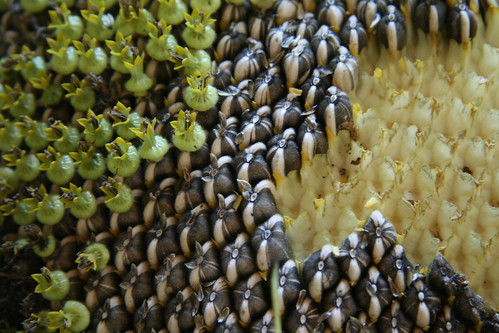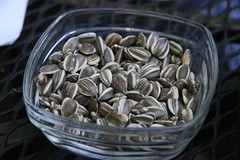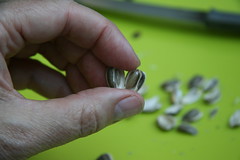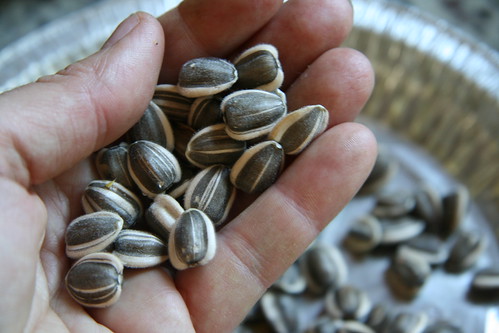I picked the giant sunflower head from my community plot yesterday. The birds had started helping themselves to the seeds. The head measured 15 inches across! Enourmous!
To make salted roasted seeds, I followed the recipe here. Clean 1 cup of seeds, boil 1 hour in salt water, the oven roast at 325 F for 45 minutes.
The seeds were yummy. Great big striped shells. We were surprised, though, at how many were empty. Out of 30 seeds I counted, only 13 had a kernel inside.
The rest of the sunflower head is out for the birds now. I’m keeping an eye on it to see if I can get a photo of a chickadee on it.
By the way, the sunflower world records are here. The largest head was 32 ¼ in. (82 cm) diameter grown by Emily Martin in Maple Ridge, British Columbia, Canada in 1983. Holy cow! That’s a big one!






7 Comments. Leave new
Whoa, that’s enormous! I didn’t even realize sunflowers could get that big. Well done!
That’s awesome! How tall was the plant?
My sunflower plant was about 10 feet tall, I think. But the head was too heavy for the stem to stay up straight. The head was totally bent around so the plant was about 6 feet tall. The stem is probably 3 1/2 inches thick.
That first picture is just AWESOME! Wow…great post. It looks like you had great success with these sunflowers.
Wow, I thought a 15 inch one was big but a 32.5 inch one is just enormous. A chickadee on a sunflower would be a very nice photo, they are so photogenic.
I have posted the veggie garden I saw in Niagara falls, here is the link
You have inspired me to harvest the sunflower seeds.
Just a point of interest on the Great Sunflower Project I am a part of, the researchers are asking for us to send the spent heads (they are much, much smaller) of the sunflowers which we have grown for this project. They want to do just what you did…analyze how many seeds were fertilized. This is just another indication of the presence of bees in the garden.
Now thats a big sunflower head. Im just getting started, one day -hopefully- mine will be that big.
BTW – love what you've done with your garden.
http://www.rldlife.blogspot.com